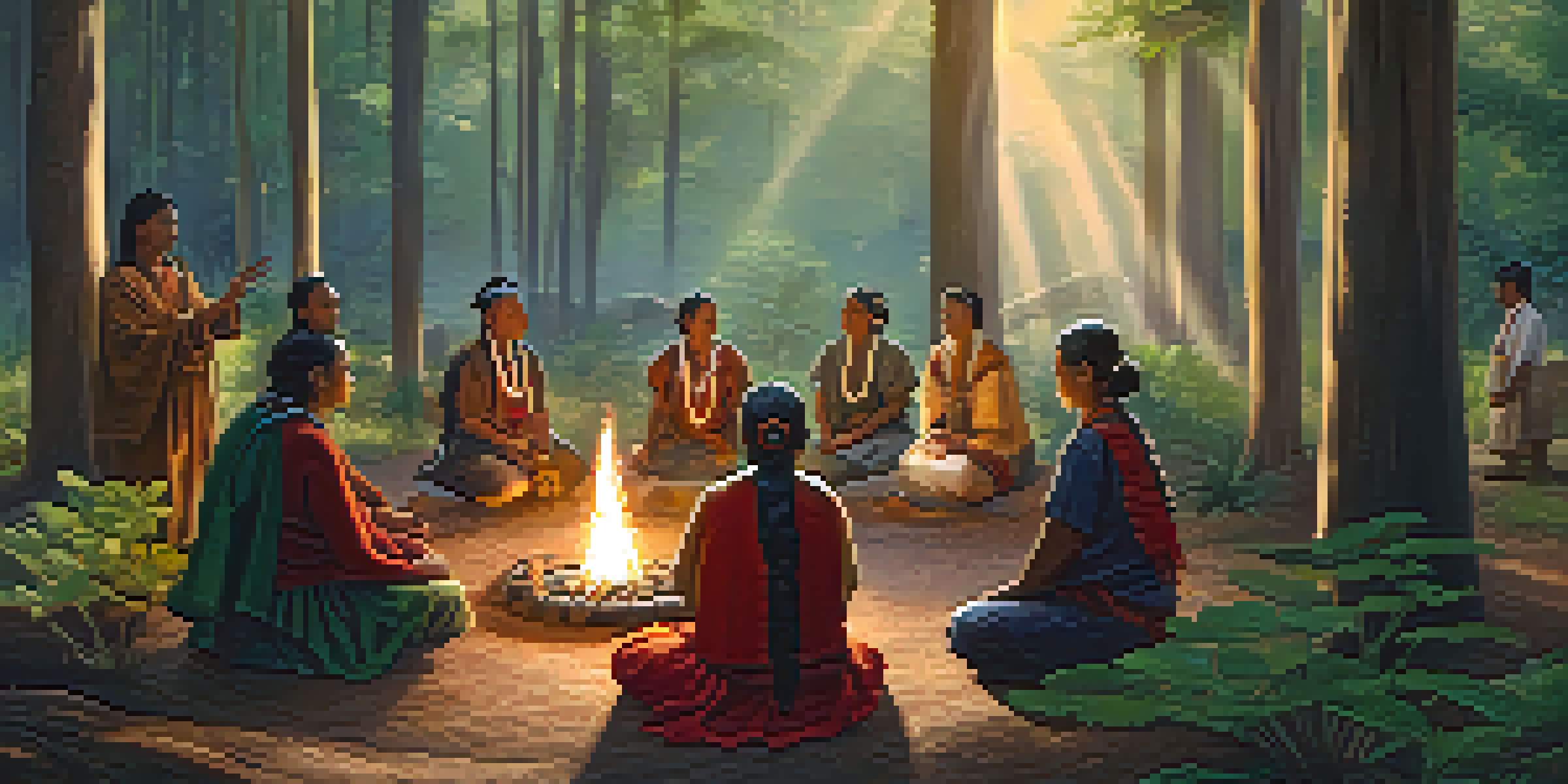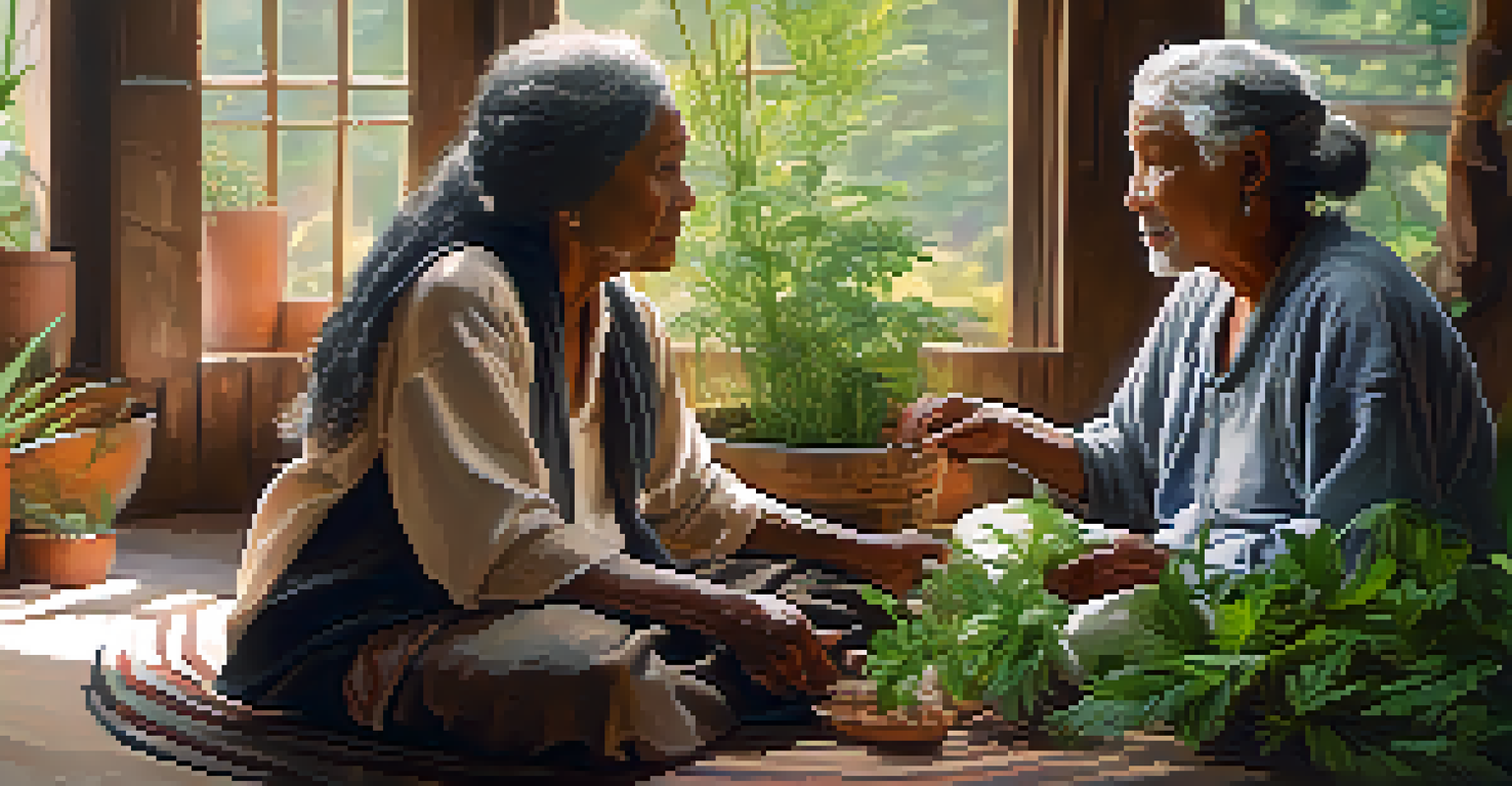Indigenous Health Practices and Their Cultural Significance

Understanding Indigenous Health in Cultural Contexts
Indigenous health practices are deeply rooted in the cultural traditions of various Indigenous communities. These practices often emphasize a holistic view of health, integrating physical, mental, emotional, and spiritual well-being. By understanding health within this cultural context, we can appreciate how these practices are not just medical treatments but a way of life that reflects the community's values and beliefs.
Indigenous health is not just about individual physical well-being; it encompasses the holistic connection between people, their culture, and their environment.
For example, many Indigenous groups view health as a balance between the individual and their environment, fostering a sense of interconnectedness. This perspective encourages practices that promote not only personal health but also the health of the community and the land. Recognizing this interconnectedness is crucial for anyone looking to understand Indigenous health practices more comprehensively.
Furthermore, these practices often include traditional healing methods that have been passed down through generations. From the use of medicinal plants to ceremonies aimed at restoring balance, Indigenous health practices embody a rich tapestry of knowledge and wisdom that speaks to the resilience and adaptability of these cultures.
Traditional Healing: A Blend of Nature and Culture
At the heart of many Indigenous health practices is traditional healing, which utilizes natural resources to promote health. Healers, often referred to as medicine people, are respected figures in their communities who possess extensive knowledge of herbs and natural remedies. This connection to nature is not only practical but also reflects a profound spiritual relationship with the earth.

For instance, in many Indigenous cultures, specific plants are used for their healing properties, such as sage for purification or willow bark for pain relief. This medicinal knowledge is often acquired through ancestral wisdom and can vary significantly between different Indigenous groups, showcasing the unique practices that define each culture. It also emphasizes the importance of biodiversity and preserving natural habitats.
Holistic Indigenous Health Practices
Indigenous health practices emphasize a holistic view that integrates physical, mental, emotional, and spiritual well-being.
Moreover, traditional healing practices often involve rituals and ceremonies that enhance the therapeutic effects of the remedies. These practices can include singing, drumming, or storytelling, which help to create a supportive environment for healing. Such rituals underscore the belief that healing is a communal process, further intertwining health with cultural identity.
The Role of Ceremony in Indigenous Healing Practices
Ceremonies play a vital role in Indigenous health practices, serving as a bridge between the physical and spiritual realms. These rituals can vary widely, from sweat lodges to healing circles, and are often designed to restore balance and harmony within individuals and communities. The act of participating in these ceremonies fosters a sense of belonging and connection, which is crucial for overall well-being.
The most important thing in healing is community. When we come together, we harness a collective strength that empowers us all.
For example, a common healing ceremony might involve community members gathering to support an individual facing health challenges. Through collective prayer, singing, and sharing, participants create a nurturing environment that aids the healing process. This communal support reinforces the idea that health is not solely an individual endeavor but a shared responsibility.
In addition, ceremonies often mark significant life events, such as births or transitions, emphasizing the ongoing journey of health and wellness. These practices highlight the importance of cultural identity and continuity, as they are often rooted in ancestral traditions passed down through generations. Ultimately, ceremonies enhance the healing experience by fostering spiritual connection and community solidarity.
Cultural Significance of Elders in Indigenous Health
Elders hold a revered position within Indigenous communities, often regarded as the keepers of knowledge and wisdom. Their roles in health practices are essential, as they guide younger generations in understanding traditional healing methods and cultural values. Elders not only provide medical advice but also impart life lessons that underscore the importance of community and interconnectedness.
For instance, an elder may share stories about their own healing journeys, illustrating the importance of resilience and patience in the face of adversity. These narratives serve as powerful teaching tools, helping individuals navigate their health challenges while reinforcing cultural identity. The wisdom of elders enriches the healing process and strengthens community bonds.
Role of Community in Healing
Community support is essential in Indigenous cultures, fostering emotional resilience and collective healing through shared experiences.
Moreover, the presence of elders in health practices reinforces the idea that healing is a lifelong journey, deeply connected to one's cultural heritage. This relationship fosters respect for the past while embracing the future, ensuring that traditional practices remain vibrant and relevant. By honoring elders, Indigenous communities continue to nurture their cultural roots while adapting to contemporary health challenges.
Challenges Facing Indigenous Health Practices Today
Despite the profound significance of Indigenous health practices, these traditions face numerous challenges in today's society. Modernization and the encroachment of Western medical practices often overshadow traditional methods, leading to a decline in their use. This shift can result in a loss of cultural heritage and knowledge, impacting the overall health of Indigenous communities.
Additionally, systemic barriers, such as limited access to healthcare services and socio-economic disparities, further complicate the situation. Many Indigenous individuals struggle to navigate a healthcare system that may not fully understand or respect their cultural practices. This disconnect can lead to mistrust and reluctance to seek help, perpetuating health disparities.
Furthermore, the ongoing effects of colonization have left many Indigenous communities grappling with trauma and loss, which can hinder their ability to maintain traditional practices. Addressing these challenges requires a collaborative approach that respects Indigenous knowledge while integrating it into contemporary health systems. By valuing these practices, we can work towards a more inclusive and effective healthcare landscape.
The Healing Power of Community in Indigenous Cultures
Community is a cornerstone of Indigenous health practices, emphasizing the collective over the individual. This sense of belonging fosters emotional support and resilience, which are crucial for maintaining health and well-being. When community members come together to support one another, they create a strong network that can help individuals navigate their health challenges more effectively.
For example, community gatherings often serve as platforms for sharing knowledge about health and wellness. These events can include workshops on traditional healing methods, where members learn from one another and collaborate on health initiatives. Such communal efforts not only reinforce cultural identity but also empower individuals to take charge of their health.
Challenges to Traditional Practices
Modernization and systemic barriers pose significant challenges to the preservation and practice of Indigenous health traditions.
Moreover, the emphasis on community within Indigenous cultures encourages a holistic approach to health, where emotional and spiritual well-being are just as important as physical health. This interconnectedness helps to create a supportive environment that fosters healing on multiple levels. Ultimately, the healing power of community highlights the importance of social connections in promoting overall health and resilience.
Integrating Traditional Practices into Modern Healthcare
The integration of Indigenous health practices into modern healthcare systems is a growing area of interest and necessity. By recognizing the value of traditional healing methods, healthcare providers can offer a more comprehensive approach to health that respects cultural diversity. This integration can lead to improved health outcomes for Indigenous individuals, fostering a more inclusive healthcare environment.
For instance, some healthcare facilities have begun to collaborate with Indigenous healers to create culturally relevant programs that address the unique needs of Indigenous populations. These initiatives often include incorporating traditional practices alongside Western medicine, allowing individuals to choose the path that resonates most with their beliefs and values. Such collaborations demonstrate a commitment to honoring Indigenous knowledge while improving health access.

Additionally, training healthcare professionals in cultural competency is crucial for fostering respectful relationships with Indigenous communities. By understanding the significance of traditional practices, providers can better support their patients' healing journeys. This collaborative approach not only empowers Indigenous individuals but also enriches the healthcare system as a whole.
Conclusion: Preserving Indigenous Health Practices for Future Generations
As we delve into the significance of Indigenous health practices, it becomes clear that preserving these traditions is vital for future generations. These practices represent a wealth of knowledge that encompasses not only methods of healing but also cultural identity and community connection. Ensuring their survival is essential for maintaining the health and well-being of Indigenous populations.
Efforts to revitalize traditional practices can take many forms, from educational programs to community initiatives aimed at fostering cultural pride. By engaging younger generations in these practices, we can cultivate a renewed appreciation for their cultural heritage and wisdom. This continuity is crucial for strengthening community bonds and enhancing resilience.
In conclusion, recognizing the cultural significance of Indigenous health practices is a step towards a more inclusive and equitable healthcare system. By valuing these traditions and embracing collaboration, we can create a future where both Indigenous and modern health practices coexist harmoniously, benefiting all members of society.